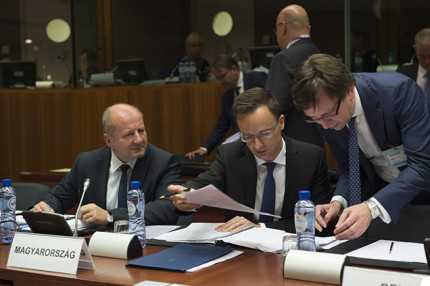Substantial Forces Must Be Present in Crisis Areas Posing Threats to Europe
Szöveg: honvedelem.hu / MTI | 2016. november 17. 9:52In an interview to Hungarian news agency MTI on Tuesday, 15 November, Minister of Defence Dr. István Simicskó underlined that in order to stop illegal migration, substantial forces must be present in crisis zones posing threats to Europe.
The Minister of Defence told MTI that together with Péter Szijjártó, they were among the first contributors in a debate on the global strategy that the High Representative of the European Union for Foreign Affairs and Security Policy had presented in the summer. A comprehensive goal of the European Union’s global strategy is to make it a strong player in the arena of international politics. Among EU citizens, there is a growing demand for the European Union to guarantee their defence and security. Dr. István Simicskó said that a kind of cooperation must be developed in the field of the EU’s common security and defence policy (CSDP) that will be effective, successful and able to deliver real security for the citizens of the European Union. He also underlined that the document on the EU’s global strategy states that illegal migration must be stopped. Uncontrolled migration leads to instability and an increasing level of terrorist threat to Europe, Dr. István Simicskó pointed out, adding that the citizens’ security must be ensured directly, through the defence of member states and the protection of the Schengen borders. At the same time, he emphasized that the European Union must deploy more substantial forces and assume a more effective role in crisis areas causing migration.

Dr. István Simicskó said that in order to stem the wave of illegal migration, the EU must generate a military capability strengthened with police and civilian forces that can be stationed in crisis zones posing threats to Europe and is able to independently carry out crisis management tasks. The minister told MTI that a decision has been made about developing closer cooperation among member states in the field of security and defence policy. Besides declaring this intention, another important element is to establish a level of ambition for military planning, i.e. the extent of required capabilities and forces that the member states must have at their disposal so that the EU be able to take effective steps independently in order to guarantee the security of the member states. Furthermore, the development of military capabilities must become more coordinated in the future, he added. Dr. István Simicskó told MTI that all participants agreed that NATO remains the core provider of collective security, and were of the opinion that “a stronger European defence will make also NATO stronger". The process of defence planning must take into account the fact that most EU member states are NATO member countries as well, so it is important to avoid any duplication in the declared forces. For this reason, the planning must be coordinated with NATO, and the EU–NATO cooperation must be intensified.
Heads of state and governments are expected to discuss the implementation plan for the European Union’s global strategy in December. At the Brussels meeting, Dr. István Simicskó also gave information about a meeting of defence ministers of the Central European Defence Cooperation (CEDC) held during the previous week in Austria. As he noted, in addition to the ministers from Austria, Slovakia, Poland, Slovenia and Croatia, further participants included representatives of Poland in an observer status, as well as those of Montenegro, Serbia and Macedonia, three countries affected by the migration crisis. The discussion focused on the migrant crisis situation, and the participants agreed that this migration crisis will present one of the greatest challenges to Europe, so that an inventory must be made of all available civilian, military and police resources. They consider it important to discuss these issues with the ministers of interior at the next meeting, which will be iterated in the future on a regular basis. They agreed that the CEDC will also draw up an action plan for the border protection of countries along the Western Balkans route, and that in the interest of stability in the Western Balkans, the mandate of EUFOR Operation Althea will be extended in Bosnia-Herzegovina.